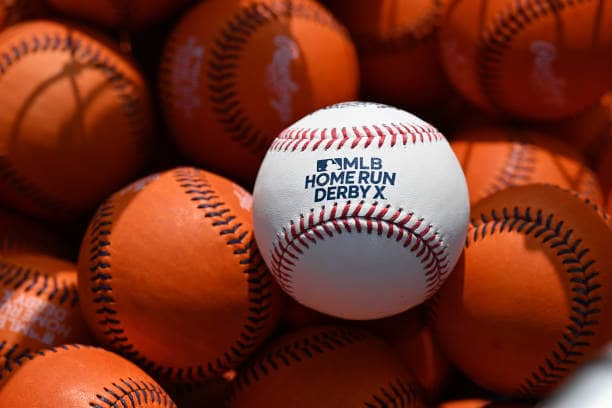For many baseball fans, the most exciting night of the MLB season isn’t the Draft, All-Star Game or even the World Series. It’s the Home Run Derby.
After all, what’s better than watching baseball’s most thrilling play – the long ball – countless times over the course of several hours?
Sports bettors can make the derby even more exciting by betting on it at our favorite MLB betting sites, many of which have odds for the event. Bettors can wager on who will win the tournament along with other fun prop bets.
The 2024 Home Run Derby starts at 8 p.m. ET on Monday, July 15, from Globe Life Field in Arlington, Texas. New bettors in legal sports betting states still have time to sign up for an online sportsbook and claim a welcome offer before the derby starts.
With that in mind, here’s everything you need to know about the Home Run Derby.
Home Run Derby Odds
The field for the 2024 Home Run Derby is set, featuring a mix of exciting young players and established sluggers.
All participants have plus odds for this event, indicating that they are underdogs against the field. The number next to the plus sign shows how much money you’d win on a $100 bet.
For example, if you wager $100 on Gunnar Henderson to win the Home Run Derby, you stand to win $475. Accordingly, this is a good market to use a bonus bet on if you sign up for one of these betting sites.
Here are the odds for all eight contestants to win the Home Run Derby. Odds are from DraftKings Sportsbook and subject to change.
- Pete Alonso: +330
- Bobby Witt Jr.: +425
- Marcell Ozuna: +425
- Gunnar Henderson: +475
- Adolis Garcia: +550
- Teoscar Hernandez: +950
- Jose Ramirez: +1300
- Alec Bohm: +1600
How To Bet On The Home Run Derby
Betting on the Home Run Derby is fairly simple, especially if you’ve already bet on baseball before.
The most straightforward bet is an outright wager on which player will win the tournament. It doesn’t matter how many home runs he wins by or who he beats. As long as he’s the last player standing, you’ll win your bet. This is the best kind of wager for a new or casual bettor.
More serious bettors and baseball fans can consider diving into prop bets, which are wagers on specific outcomes in the derby. For example, you can bet on markets like who will hit the most home runs in the first round or which player will hit the longest home run.
Markets will vary by sportsbook, so your betting options may be limited depending on which betting sites you have access to.
These can be a fun way to spice up your betting beyond picking the winner. Correctly guessing the outcomes of an exhibition contest is difficult, however, so we recommend wagering smaller units on these markets.
Who Are The Favorites?
Pete Alonso has the shortest odds to win the Home Run Derby at +330, which isn’t surprising considering he’s the only previous winner in this year’s field.
Already a two-time champion, Alonso won back-to-back derbies in 2019 and 2021 (the 2020 event was canceled due to Covid). If he wins again, he’ll tie Ken Griffey Jr. for most derby wins in MLB history. He ranks fifth in the National League with 19 home runs.
Marcell Ozuna and Bobby Witt Jr. are tied for the second-shortest odds +425. Ozuna is the oldest player in the field at age 33, but he’s still one of the most dangerous hitters in baseball. The veteran slugger set a personal best with 40 home runs last year and is on pace to surpass that total if he stays healthy. His 26 home runs rank fourth in MLB and second in the NL behind Shohei Ohtani (29).
Meanwhile, Witt Jr. is the second-youngest player in the field at age 24. Now in his third season, the first-time All-Star smashed 30 homers last year and leads MLB in hits (125) this season. He also has 16 homers and ranks sixth in the American League in slugging percentage (.558).
The only player younger than Witt is Henderson (23), who has the fourth-shortest odds at +475. He ranks third in MLB with 28 homers, already matching his career-high from last year. The first-time All-Star leads MLB with 78 runs and ranks third in the AL in slugging percentage (.584).
Notably, the three players with the shortest odds (Alonso, Ozuna and Witt) all bat right-handed, which gives them an edge based on the stadium’s park factors (see below).
Home Run Derby Stadium
As baseball fans know, every stadium is unique and can have varying effects on offense. Outfield dimensions, fence height, wind currents, temperature, humidity and elevation can all impact power numbers, making home runs more or less likely compared to other parks.
Globe Life Field opened in 2020, so it doesn’t have as much data as older stadiums. However, here are some key things to note about the park and how it could affect the Home Run Derby.
Here are the ballpark dimensions:
- Left Field: 329 feet
- Left Center: 372 feet
- Center Field: 407 feet
- Right Center: 374 feet
- Right Field: 326 feet
As you can see, the outfield at Globe Life Field is nearly symmetrical. The right field wall is three feet closer down the foul line compared to the left field wall, but the power alley in left center is two feet closer.
The outfield wall has a uniform height of eight feet, so the dimensions alone do not favor one handedness over the other.
Given its location in a warm climate, Globe Life Field is one of the most homer-friendly parks in the majors. According to Statcast, it’s been the fourth-most favorable park for home runs over the last three years with 16% more home runs than average.
Looking at handedness, Globe Life Field favors right-handed hitters slightly more than left-handed hitters. Over the last three years, home runs at Globe Life Field are 20% above average for righties compared to 10% above average for lefties.
As such, a right-handed hitter like Alonso or Adolis Garcia is more likely to win the event than a left-handed hitter like Henderson.
One thing to keep in mind about Globe Life Field is that it has a retractable roof. If the roof is closed for the Home Run Derby, that will likely reduce the temperature in the stadium, eliminate any wind patterns and potentially suppress home runs.
Home Run Derby Rules
The Home Run Derby rules have changed a lot over the years, including again in 2024. Here’s an overview of the updated format.
Rounds
The derby has three rounds.
All eight hitters compete in the first round, and the four hitters with the most home runs advance to the second round.
In the second round, there are two head-to-head matchups. The player with the most home runs faces the player with the fewest home runs, while the players with the two middle totals face each other.
The winners of those matchups advance to the final round, where the player who hits the most home runs wins.
Pitch & Time Limits
Each round is timed. Players get three minutes to hit as many home runs as possible in the first and second rounds.
The final round is shorter, lasting two minutes for each player.
However, players can now only see a certain number of pitches each round, encouraging them to swing away. The maximum is 40 pitches in each of the first two rounds and 27 pitches in the second round.
A player’s round ends depending on which limit he hits first – the time limit or the pitch limit.
Bonus Periods
Each player gets a bonus period after his round ends. Bonus periods are not timed and last three outs. Each swing that does not produce a home run is considered an out.
If a player hits a home run that travels at least 425 feet during the bonus period, he’ll receive four outs instead of three.
Timeouts
Batters can take a 45-second timeout whenever they want in each round to catch their breath and grab some water. However, they are not allowed to call a timeout during a bonus round.
Tiebreakers
If multiple players finish with the same amount of home runs in a round, there will be a “swing-off” to determine the winner. The tiebreaker lasts 60 seconds for each player and does not include any breaks.
If players remain tied, they have another tiebreaker where both players are limited to three swings. These shorter tiebreakers continue until a winner is decided.
Past Home Run Derby Winners
The Home Run Derby has been around since 1985. As mentioned above, Ken Griffey Jr. holds the record for most victories with three, followed by Pete Alonso, Yoenis Cespedes and Prince Fielder with two.
Alonso is the only previous champion in this year’s field, making it likely that there will be a first-time winner in 2024.
Home-field advantage does not appear to be a significant factor in the Home Run Derby. Of the 37 derbies so far, only three of them featured the champion playing in his home park, most recently with Bryce Harper at Nationals Park in 2018.
Here’s the list of every Home Run Derby winner since 2010:
- 2024: Teoscar Hernandez
- 2023: Vladimir Guerrero Jr.
- 2022: Juan Soto
- 2021: Pete Alonso
- 2019: Pete Alonso
- 2018: Bryce Harper
- 2017: Aaron Judge
- 2016: Giancarlo Stanton
- 2015: Todd Frazier
- 2014: Yoenis Cespedes
- 2013: Yoenis Cespedes
- 2012: Prince Fielder
- 2011: Robinson Cano
- 2010: David Ortiz
Photo by Greg Fiume/MLB Photos via Getty Images


